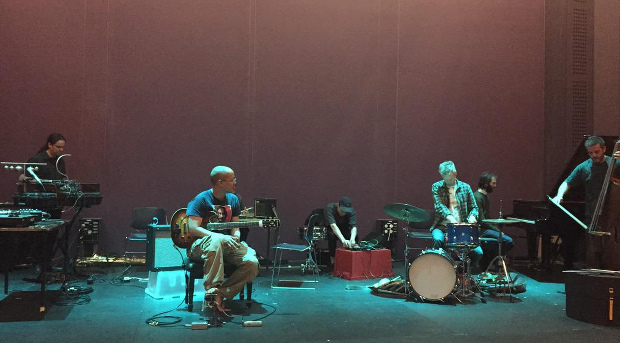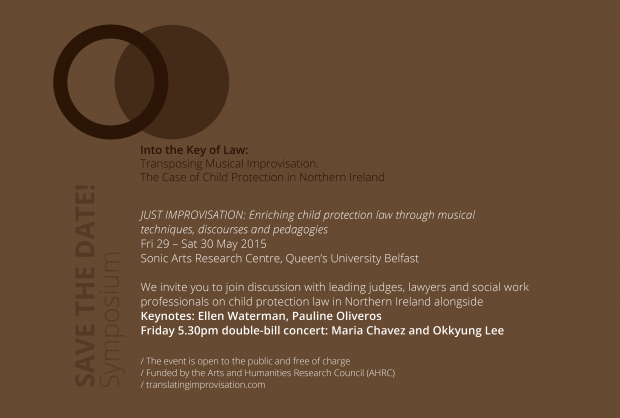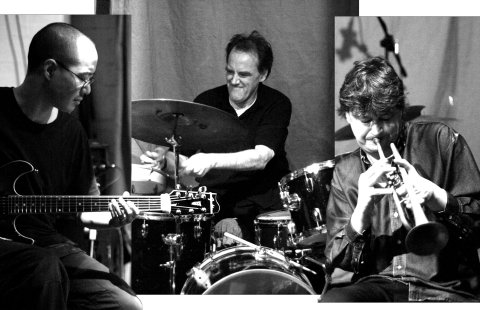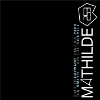
Simon Rose: “Did you know how loud you were?”
Han-earl Park: “Oh. Yes.”
Rose: “I thought you did.”
Thoughts and questions in response to Translating Improvisation’s symposium back in May from the POV of an institutionally unaffiliated, sometimes teacher, amateur scholar and anthropologist [previous twitter transcripts…]. Below the fold is an unedited twitter transcript of my observations from Just Improvisation. My original observations came in the form of tweets (some written ‘live’, most posted subsequently) via @hanearlpark that spanned the first panel discussions, Ellen Waterman’s keynote presentation, concert performances by Okkyung Lee and Maria Chavez, the Deep Listening Workshop with Pauline Oliveros, and the workshop-performance which forms the main subject of my discussions.
My questions and observations are indebted to discussions with @franzschroeder, @wildsong, @tomarthursmusic, @pauljstapleton, @MortButane, @olivep, @davekanemusic, @zeittraumism, @nickreynoldsatp and @JoshSinton both on- and off- the twitterverse.
The rants (and typos), however, are entirely my own 😉
Twitter transcript (unedited)
Responses to Symposium Day 1: Belfast, May 29, 2015
May 29: Let’s start this w/ informal, visible demographic survey (a la #isim2014 #amspittsburgh #rsa2014)… #amateuranthropology #justimprovisation
May 29: …Suits. Lots* of suits. #amateuranthropology #justimprovisation
May 29: …* ‘Lots’ may be relative.** #amateuranthropology #justimprovisation
May 29: …** ‘Relative’ may speak more to the prejudices of the observer. #amateuranthropology #justimprovisation
May 29: ‘Adversity’ noun: “difficulties; misfortune”… #justimprovisation
May 29: …Potential tripping hazard in interdisciplinary meetings? possible misunderstanding(s) (creative or otherwise)? … #justimprovisation
May 29: …What is, for eg, the relationship btwn ‘adversity’ and ‘struggle’? #justimprovisation
May 29: …‘Adversity’ is not a term afaik improvisers enroll in their discussions, but ‘struggle,’ yes, often, maybe always. #justimprovisation
May 29: …Also ‘difficulty,’ ‘problematic,’ ‘risk’—difficult/problematic terms w/ differing creative/social ramifications. #justimprovisation
May 29: …false friends? I doubt these terms say much about the specifics of the creative or the social… #justimprovisation [1/2]
May 29: …—or their corresponding discourses—but it may be tempting to draw simple correlations. #justimprovisation [2/2]
May 29: …Like I said, potential tripping hazards. #mistakenembrace #justimprovisation
May 29: “Start to grapple with that fluidity.” #justimprovisation
May 29: ‘Proceduralized.’ Good word. Potential #artspeak right there. #linguisticdetritus #randomactsofpoetry #justimprovisation
May 29: “We’ve seen an 18% increase…” I’d love to write program/liner notes w/ this language. #technocracy #artspeak #justimprovisation
May 29: …How do we reconcile the need for ‘fluidity’ when the rhetorical justification uses… #linguisticdetritus #justimprovisation [1/2]
May 29: …such technocratic, bureaucratic language? #linguisticdetritus #justimprovisation [2/2]
May 29: “Risk”; that word again. #artspeak #linguisticdetritus #justimprovisation
May 29: Improvisation as an “unruly domain”. #justimprovisation
May 29: …Improvisation as a ’domain’? as a ‘site’? (Not an act?) #performance #identity #sociality #justimprovisation
May 29: Didn’t multiculturalism die at the hands of diversity? … #genuinequestion #justimprovisation
May 29: …or at least did not diversity explode the problematics (and necessary violence) of multiculturalism? #justimprovisation
May 29: “Musically satisfying ensemble.” ‘Satisfying’ #hmm By what criteria? #justimprovisation
May 29: ‘Recognition’ as the mechanism of identity (w/ minorities)? What about whiteness? heteronormativity? #hegemony #othering #justimprovisation
May 29: Equality = refusal to recognize difference. #justimprovisation
May 29: ‘Authentic self’? Is there the trap of essentialism there? #justimprovisation
May 29: Is the mechanism of improvisation based on exchanges? #genuinequestion #justimprovisation
May 29: I’ll ask this again for emphasis: Is exchange the primary/necessary/root mechanism of improvisation? #genuinequestion #justimprovisation
May 29: “Identities are always contingent.” Yes. This. #justimprovisation
May 29: Do the musical terms dissonance/harmony correspond to social/power relationship? … #justimprovisation
May 29: …or are we falling back on (liberal humanist) bad habits of old musicology? #justimprovisation
May 29: “Unvoicing of ulterity.” #justimprovisation
May 29: I don’t buy the distinction btw ‘traditional’ and ‘creative’ improvised musics. #idiom #tradition #creativity #justimprovisation
May 29: …pretty much said the same in a discussion with @tomarthursmusic afterwards. #justimprovisation
May 29: More thoughts: everytime I see OL perform, I think, damn; she’s better than the rest of us put together. #justimprovisation
May 29: Much transducer based music or #soundart would be improved by judicious enrolling of highpass filters. #impedance #justimprovisation
May 29 [in reply to…]: .@nickreynoldsatp I just don’t buy the one-on-one correspondence of musical and social dissonance/harmony. Instead… #justimprovisation [1/2]
May 29: .@nickreynoldsatp …it strikes me that _making_ the distinction btwn dissonance & harmony is the political act. #justimprovisation [2/2]
Responses to Symposium Day 2: Belfast, May 30, 2015
May 31: 0. Some more thoughts from the #justimprovisation symposium coming up…
May 31: 1. Find myself (my accident, of course) sitting next to @olivep during the Deep Listening workshop… #justimprovisation
May 31: 2. …and learned that I can not only listen thru the soles of my feet, but… #justimprovisation #body #physiology #listening
May 31: 3. …that I can triangulate the source of the vibration w/ two feet. Stereo! #justimprovisation #body #physiology #listening
May 31: 4. During the course of discussions, an improvising ensemble is frequently compared to that of a family… #justimprovisation
May 31: 5. …but escaping familiar relations are by degrees of magnitude so much harder than leaving an ensemble. #justimprovisation
May 31: 6. I am, however, reminded of the oft used terms ‘leader’ & ‘collective’ in the context of improvising micro-societies. #justimprovisation
May 31: 7. And tho we often idealize one form over another, ‘leader’ & ‘collective’ denote only 2 possible ways of organizing… #justimprovisation
May 31: 8. …each problematic, each utopian, in their way; neither quite fully descriptive of the dynamics of social play. #justimprovisation
May 31: 9. Leaders: such strong personalities (egos?) holding ensembles together… #justimprovisation
May 31: 10. …Ellington? Mingus? Bley? Guy? Mitchell? Paternalistic, nurturing, playful, autocratic, managerial, or bullying… #justimprovisation
May 31: 11. …Were we waiting for (or in need of) the ‘leader’ (such as @olivep) in the #justimprovisation ensemble…?
May 31: 12. In contrast to Call Them Improvisors! in 2011 in which we all bowed down to EP? #justimprovisation
May 31: 13. (Aside: but there may be no leaders, just those willing to be lead. We can too easily mistake effect for cause.) #justimprovisation
May 31: 14. Collective: idealized, utopian, but how do these work? How does collectivism work w/out violence to diversity…? #justimprovisation
May 31: 15. …afaik, closest to coop/‘family’ improvised musics was the AEC. But that ensemble emerged from Mitchell’s group… #justimprovisation
May 31: 16. …Felt as tho the #justimprovisation group desired (or felt we _should_ desire) a collective, but we were so polite (and yet so violent)…
May 31: 17. “Fuck you.” Someone says during the post-workshop discussions. ‘Yeah,’ I think, ‘exactly: “fuck you.”’ #justimprovisation
May 31: 18. Be back later with more thoughts on violence, alliances, autocracy and sociality coming up. #justimprovisation
Jun 24: 19. More thoughts on violence, alliances, autocracy and sociality from @translat_improv’s #justimprovisation symposium coming up…
Jun 24: 20. During #justimprovisation an improvising ensemble is frequently compared to that of a family… http://twitter.com/hanearlpark/status/604953995489234944
Jun 24: 21. …but familial relationships often seem less about choice of partners than, generally, a musical ensemble… #justimprovisation
Jun 24: 22. …we choose our bands in a way we can’t always choose our families (or we get paid)… #justimprovisation
Jun 24: 23. …that aside, are dysfunctions similar in both groups? Maybe (but how you solve/escape them are radically different). #justimprovisation
Jun 24: 24. What happens in an ensemble is brought together w/ radically different agenda, desires, skills, character, or power…? #justimprovisation
Jun 24: 25. …And what happens when those social/musical dissonances/discords are not discussed…? #justimprovisation http://twitter.com/hanearlpark/status/605081182133465088
Jun 24: 26. I want to unpack this (realize this is prob directed at a certain guitarist): http://twitter.com/davekanemusic/status/605734075446513665 #justimprovisation
Jun 24: 27. …I had certain problems w/ the amplified, steady-state ‘drone’ proponents in the #justimprovisation ensemble. I had difficulty…
Jun 24: 28. …hearing the unamplified string players in the #justimprovisation group. (It seemed to me, in such a large ensemble, the…
Jun 24: 29. …only ones who should have free license to play continuous sustained gestures were the unamplified strings/flute)… #justimprovisation
Jun 24: 30. …the rest of us would have to be more careful (we could be loud, but those gestures would have to be short)… #justimprovisation
Jun 24: 31. …talking to one of the drone proponents during the break, he responded that he wanted everyone to play drones… #justimprovisation
Jun 24: 32. …so the question: http://twitter.com/hanearlpark/status/605080336385617921 #justimprovisation
Jun 24: 33. …favorite pt of #justimprovisation may have been @MortButane (musical) response to Bennett Hogg: unexpected, oblique, left-field…
Jun 24: 34. …different, idiomatically discordant; recontextualizing Hogg’s playing (never to be heard the same way again)… #justimprovisation
Jun 24: 35. …how does one catalyze such (transformative) interactions and choices…? #justimprovisation
Jun 24: 36. …catalyze w/out ‘fixing’ the group (reminded of @JoshSinton: he’s not in the business of ‘saving’ an improvisation)… #justimprovisation
Jun 24: 37. When #justimprovisation group w/out the full complement of players (sans many quieter voices) start our performance in the afternoon
Jun 24: 38. …the ensemble launches into full-scale drone-works. I give up. It’s prob. unforgivable, but I walk off stage… #justimprovisation
Jun 24: 39. …I remember thinking: ‘I do not want to be part of this drone warfare.’ (ironic considering what is to follow)… #justimprovisation
Jun 24: 40. …If I have a problem w/ how those drones were articulated, it wasn’t the loudness of it as such, but how it subsumed… #justimprovisation
Jun 24: 41. …how it absorbed diversity and made it part of its identity. Which may be a kind of collectivism, but… #justimprovisation
Jun 24: 42. …not a collective I wanted to be part of. #justimprovisation
Jun 24: 43. Feel it’s disrespectful to walk off stage, but done it x2 since an experience some years ago: http://improvisingguitar.blogspot.ie/2007/02/mob-behavior-and-hegemonic-impulse.html #justimprovisation
Jun 24: 44. …If leaving the stage is unforgivable, then rejoining it seems like, at best, very poor manners… #justimprovisation
Jun 24: 45. …Essentially doing a pick’n’mix on what you decide to participate it. Where is the collective? collectivism? family? #justimprovisation
Jun 24: 46. In retrospect, going back on stage was a mistake, but once there, tried 2do what is the best role for the e. guitar… #justimprovisation
Jun 24: 47. …nudge, push and pull, and catalyze the existing elements that are ‘desirable’… #machiavellian?… #justimprovisation
Jun 24: 48. …but when those totalizing drones started up again for the umpteenth time, I exercised the nuclear option… #justimprovisation
Jun 24: 49. …Nuclear option? I floored it: volume pedal toe down, playing at eleven… #justimprovisation? or #unjustimprovisation?
Jun 24: 50. …Nuclear option: did I say evoking drone warfare was ironic? http://twitter.com/hanearlpark/status/613656187708510208 #justimprovisation
Jun 24: 51. …I did American Foreign Policy—indiscriminate, “bomb them back into the Stone Age”—on the collective… #justimprovisation
Jun 24: 52. …second time I’ve ever exercised the nuclear option, and, unlike last time, I’m _certain_ it was wrong wrong, wrong… #justimprovisation
Jun 24: 53. …Despite what @wildsong @olivep said, feel my response really was… immoral? Maybe. Unethical? Probably. Wrong? Wrong… #justimprovisation
Jun 24: 54. …Deniz Peters: “You autoerotic guitarist, you.” Ironic following statements about the non-semiotic nature of music? #justimprovisation
Jun 24: 55. …Simon Rose: “Did you know how loud you were?” “Oh. Yes.” “I thought you did.” #justimprovisation
Jun 24: 56. …Should someone ask for one (not that I expect anyone to), I would give my unconditional apology for what I did… #justimprovisation
Jun 24: 57. …but my question is: given the (latent/overt/potential of) violence in the ensemble (as discussed in this thread)… #justimprovisation
Jun 24: 58. …what _should_ I have done? #justimprovisation
Jun 26 [in reply to…]: .@JoshSinton No. Didn’t expect them to, but… your Q gets me asking who they should have apologized to (if at all)… #justimprovisation [1/2]
Jun 26: .@JoshSinton …to those whose voices got absorbed into the hive, or those who had difficulty hearing those voices? #justimprovisation [2/2]
Jun 26 [in reply to…]: .@JoshSinton Good question. Hmm… maybe no apologies are necessary (just some group counseling). #justimprovisation
Jun 26: .@JoshSinton As for my initial statement, for me, it’s the fact that I dropped (the musical equivalent of) nukes… #justimprovisation [1/2]
Jun 26: .@JoshSinton …wrong is wrong regardless of the reasons that compelled it. #justimprovisation [2/2]
update
10–15-22: elements of this transcript has become part of my article in The Sampler.





